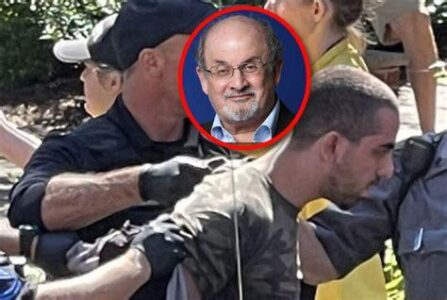
Peer attacks BBC over ‘glorifying terrorism’
The BBC has refused to back down after a former Governor of the corporation said its coverage of the Salman Rushdie attack “could amount to glorifying terrorism”, the JC can reveal.
Baroness Ruth Deech, a crossbench peer, wrote to Director General Tim Davie after a British-Palestinian commentator appeared to express sympathy for the Rushdie assailant’s extremism on the BBC News Channel.
Speaking on the BBC’s Dateline London programme in the wake of the attack, Abdel Bari Atwan — who the JC has repeatedly exposed in the past for praising terrorists as “martyrs” and calling an atrocity a “miracle” — said: “The Satanic Verses actually is blasphemy completely and it is offensive. You know, Salman Rushdie, he was very, very cruel when he talked about the Prophet Muhammad and his wives, and actually, to talk about the wives of the Prophet is really very, very dangerous.”
He added: “About 90 per cent of the people of the Muslim world believe that freedom of expression [is] practised only to insult Muslims.”
On the same day as Atwan made these remarks, he wrote in an online article: “I support [Mahmoud Abbas’s] refusal to apologise for the killing of 11 Israeli participants at the 1974 (sic) Munich Olympics, and his use of the term ‘holocausts’ to describe the many massacres to which Palestinians have been subjected by Israeli forces.”
Lord Carlile, the former independent reviewer of anti-terror legislation, has described Atwan’s YouTube channel as “full of hysterical passion” and “the warlike statement of a dangerous fanatic [which] should be examined by the police for possible breach of section 1 of the Terrorism Act 2006.”
But in a statement to the JC, the BBC stood firm, insisting that inviting Atwan was “editorially justified”, sparking outrage.
A spokesman for the Campaign Against Antisemitism (CAA) said: “Under its own ‘due impartiality’ rules, the BBC is not obliged to present the ‘other point of view’ where terror is concerned. Its defence of Atwan is inexcusable.”
Baroness Deech added: “I don’t think the BBC should have given him airtime. I think his comments about Rushdie could amount to glorifying terrorism under the 2006 Act. It is absolutely unacceptable to respond to comments with murder or violence.
“The BBC should have put someone else on at the same time (as a precaution, knowing that Atwan was likely to offend) who would have defended free speech (within the law) and pointed out that no matter how offensive, it is absolutely unacceptable to respond to comments with murder or violence.
“That failure merits a complaint to the BBC or Ofcom.”
The CAA has now filed a complaint. A CAA spokesman said: “It is time that the BBC is held to account for regularly platforming Atwan, who has reportedly expressed support for violence against the Jewish state. We are considering legal action over Atwan’s possible glorification of terrorism.”
In the article for the news site Raialyoum this month, Atwan also claimed the 1972 Munich massacre of Israeli athletes was “not committed by Abbas or by the Black September squad that abducted them”, but by “Israeli Mossad operatives and German police”.
He added: “Lapid’s hands are soaked in the blood of Palestinian children… Israel, supported by Germany’s guilt complex, considers itself above any law and feels free to twist the facts.”
In her letter to Director General Tim Davie, the Baroness demanded that the BBC adopt the International Holocaust Remembrance Alliance (IHRA) definition of antisemitism, joining Lord Eric Pickles, Robert Halfon MP, Stephen Crabb MP and Jewish bodies.
Baroness Deech said: “I would say that Atwan is guilty of antisemitism in his piece about Munich, as defined by the IHRA. I looked at his website and given his consistent offending against the IHRA over months, I don’t think the BBC should have given him airtime. There are several breaches of the IHRA definition on it going back years.”
In April, the JC revealed that Atwan described the shooting of three Israelis in Tel Aviv as a “miracle”. The terrorist, he said, was a “hero” and those fleeing for their lives were “like mice”.
A spokesperson for Camera Arabic said: “We have been documenting Abdel Bari Atwan’s praise of terrorists for some years. Despite this, the BBC still hosts Atwan on air and refuses to pledge it will stop featuring him as though he is an impartial observer.”
A BBC spokesperson said: “Abdel Bari Atwan appeared on Dateline as a commentator primarily to give his view on Saudi Arabia’s dealings with Donald Trump, and the allegations that Mr Trump had passed nuclear secrets to the Saudi state. We also felt it was important to cover the attack on Sir Salman Rushdie.
“We believe the discussion was fair and duly impartial and we believe it was editorially justified for Abdel to appear. If extreme views are expressed on the BBC, we would always seek to challenge them.”
Source: The jc





